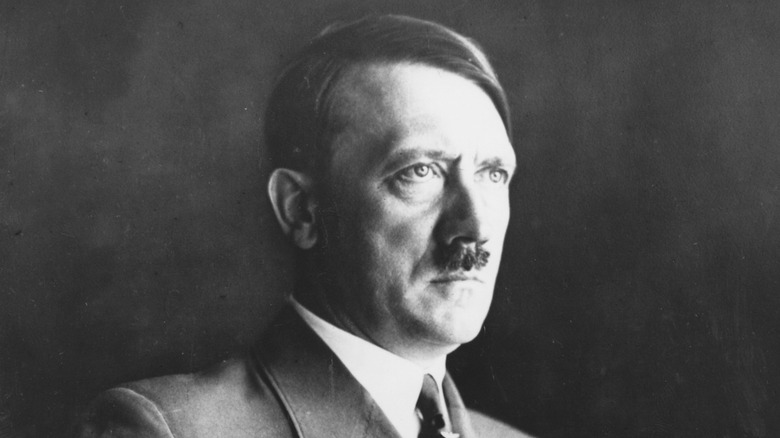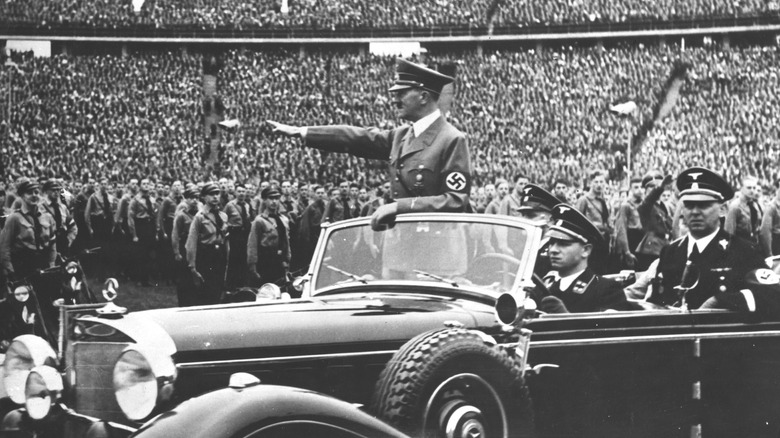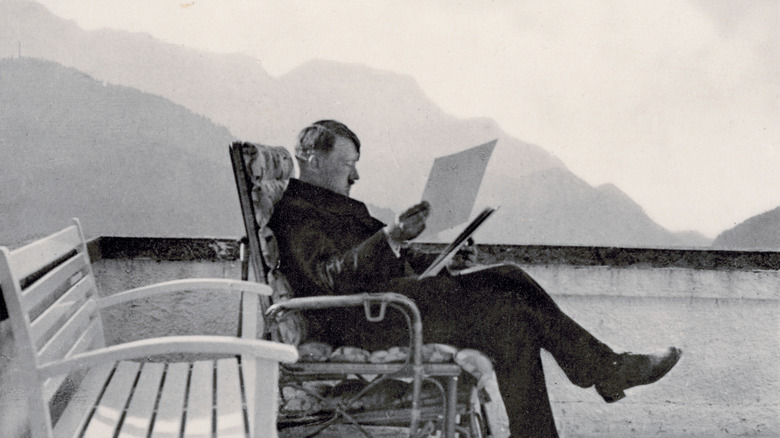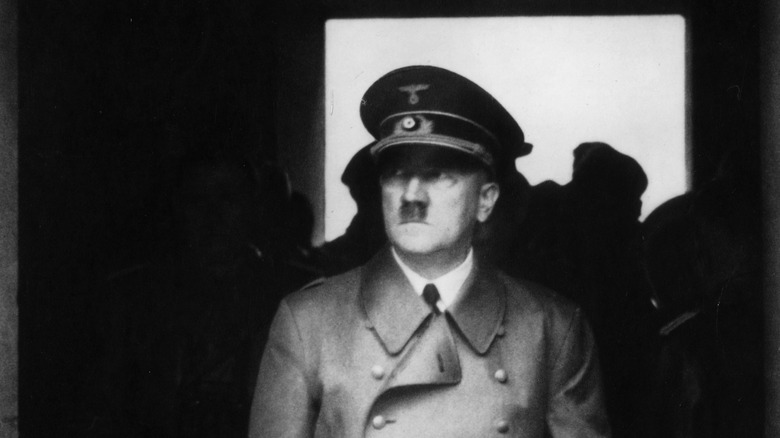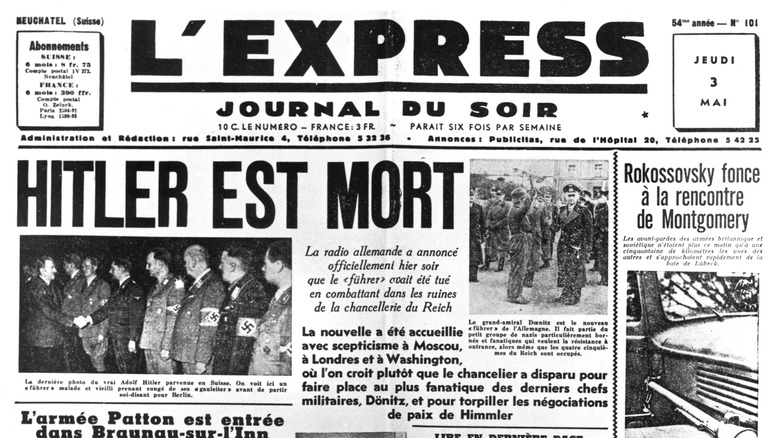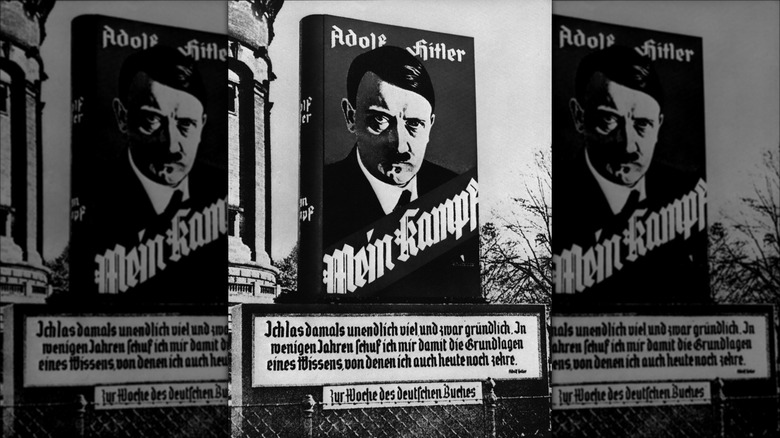What Happened To Hitler's Wealth After He Died?
When Adolf Hitler died by suicide with the fall of the Nazi Third Reich on April 30, 1945, he did so having been forced into the "Führerbunker," a series of subterranean rooms where he and his closest allies shielded themselves from the heavy bombardment of Soviet forces during the Battle of Berlin. The bunker in question was built many feet below the New Reich Chancellery, a sumptuous primary residence that the Nazi leader had commissioned in 1938 to "make an impression on people." According to "Inside the Third Riech," the memoirs of the man tasked with creating the new chancellery, Albert Speer, Hitler had ordered him to make the building quickly but "of solid construction," telling him: "The cost is immaterial."
The New Reich Chancellery was built the following year and became the center of the Third Reich until the Nazis were defeated. The story of its construction shows the vast funds that were at Hitler's disposal for the fulfillment of his every whim, with the dictator effectively having personal control over the German treasury and amassing a vast fortune of his own before his empire came crashing down. But how much was Hitler worth at the peak of his power, and what happened to his immense wealth? The short answer is that most of it was returned to those it was stolen from or reverted to the post-war German states. However, as with many deaths, there was also a notable legal battle involving those who claimed to be his inheritors. Here are the details.
Hitler's enormous wealth
Adolf Hitler came from a background of comparative poverty. Between serving in the German army and attempting to make a name for himself as an artist in Vienna, he often struggled to make ends meet. It was during this period that Hitler, frustrated by his situation, began to establish scapegoats in his mind on whom he laid the blame for what he saw as shortcomings in the German state, according to historian Ian Kershaw (via The New York Times). Thereafter, his hatred of Germany's Jewish population and of neighboring nations became central to his worldview, forming the central thread of his book, "Mein Kampf," or "My Struggle."
Published in two volumes in 1925 and 1926, when Hitler was already forcing his way to power with the National Socialist (Nazi) Party, the book eventually became a major money maker, funding his political machinations as well as generating personal wealth for the Nazi leader. When the Nazis came to power, a copy was given to every newlywed couple, amplifying sales and providing him with the equivalent of around $12 million a year. He reportedly also made a great deal of money in royalties from his official governmental portraits.
Hitler and the Nazis were also buoyed by donations from wealthy benefactors, as well as his salary for his political positions. But even as he came to power, Hitler refused to pay taxes. With the passing of the Enabling Act in 1933, Hitler consolidated the roles of Chancellor and President, cementing his position as an all-powerful dictator who could do as he pleased with Germany's finances. The following year, Hitler made himself tax-exempt.
Hitler's assets at the time of his death
Even as he was trapped in the Führerbunker and the Third Reich was crumbling all around him, Adolf Hitler remained in possession of an enormous amount of assets that today would see him considered one of the richest people on the planet, with several sources claiming he was the equivalent of a multi-billionaire. As well as the New Reich Chancellery — which was ultimately destroyed in the Battle of Berlin — Hitler had several private residences, including a home in Bavaria called the Berghof and an apartment in Munich, and had also sunk a fortune into the redevelopment of a palace in the Polish city of Poznan. The Nazis were also famous plunderers; during their expansion, they were known to have amassed a fortune in stolen art and gold, much of which was held at the German Central Bank. Though these assets would have been described as being in possession of the Reich rather than Hitler personally, as dictator he was free to enjoy the nation's treasure as he pleased.
Though it is impossible to know how much he held in bank accounts at the time of his death, sources such as The New York Times posit that he "died rich," and he has been variously described as being at least the equivalent of a multibillionaire, though some wilder estimates claim that at his peak he may have controlled $1 trillion in assets.
Hitler's last will and testament
The day before his suicide, when he realized that the Nazi reign was coming to an end, Adolf Hitler dictated his last will and testament. In it, the soon-to-be-defeated dictator railed against his enemies, including former allies whom he accused of being responsible for the downfall of the Third Reich, and announced his marriage prior to his certain death to his longtime partner, Eva Braun. He also claimed that after his death: "What I own belongs — as far as it is of any value at all — to the [Nazi] party. Should the party no longer exist it will belong to the state. Should the state also be destroyed, any further decision from me is no longer necessary" (per the Eisenhower Library).
Hitler also makes mention of his art collection, which he claims was never gathered together for his private gratification, but rather "exclusively for the creation of an art gallery in my native town of Linz a.d. Donau." The document was smuggled out of the Führerbunker under the supervision of Hitler's chosen executor, the loyalist Martin Bormann, whom Hitler's will says can take whatever mementos he likes from among the deceased leader's possessions, and offered sentimental items to his siblings, mother-in-law, and assistants.
His assets returned to Bavaria
Of course, the Allied liberators of Nazi Germany were unlikely to ever fulfill the final wishes of the man behind the fascist dictatorship which today is believed to have been responsible for leading to the deaths of 40 million people involved in World War II and the Holocaust. When his last will and testament finally fell into the hands of Allied forces after the Battle of Berlin, it was treated more as a curio than a legal document, with a copy being presented to President Harry S. Truman and later being put on display in the U.S. National Archives.
However, in a way his will was partially fulfilled, in that what could be recovered of his fortune — the exact arrangement of his finances is still a matter of speculation even today — reverted to the state. In Hitler's case, his known funds as well as the intellectual property rights to his book "Mein Kampf" reverted to the federal state of Bavaria, which suppressed further publication of the book in Germany after Hitler's death, until the copyright finally expired in the 2010s. Bavaria, where Hitler was registered as a resident, also took control of Hitler's surviving German residences and other identifiable assets. In 1996, it was widely reported that investigators believed they had uncovered additional Swiss bank accounts that may hold millions in royalties belonging to Hitler.
Hitler's sole inheritor
But the story doesn't end there. Despite the worldwide contempt that Adolf Hitler was held in after the end of the war and the revelation of the reality of the Nazi concentration camps and the holocaust that had taken the lives of 6 million people, his sister, Paula, stepped into the public eye to try and claim her portion of his fortune,
However, Paula's inheritance claim was complicated for many years by the fact that Hitler's body hadn't been properly identified, having been burned to ash along with Eva Braun's in the Chancellery garden shortly after his death. It would be decades before bone fragments collected from the scene were confirmed as belonging to the dead Führer.
Nevertheless, according to Anton Joachimsthaler's "The Last Days of Hitler: The Legends, the Evidence, the Truth," Paula moved into Hitler's Munich apartment in 1952 and continued her legal challenge despite a lack of a death certificate. She died on June 1, 1960. Her inheritance comprising two-thirds of Hitler's known estate was finally granted to her five months later.
